How Agriculture Policy Impacted on Edo South Environment and Livelihoods of Small Farmers
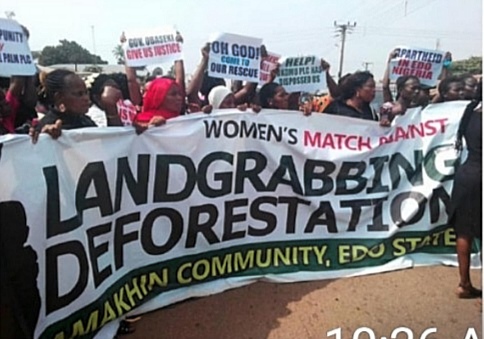
Some Community members protesting against Edo State Government over forceful takeover of their lands
Edo State Government in the last Eight years, is unarguably the most aggravator of Environmental Conservation and Livelihood scourges, since 60 years ago, when it was founded as Midwest Region, Bendel State and presently Edo State. TONY ERHA, a Journalist and Environmental Conservationist and Orobosa Omo-Ojo, Publisher, Midwest Herald in this report, traces the endemic challenges faced by different communities.
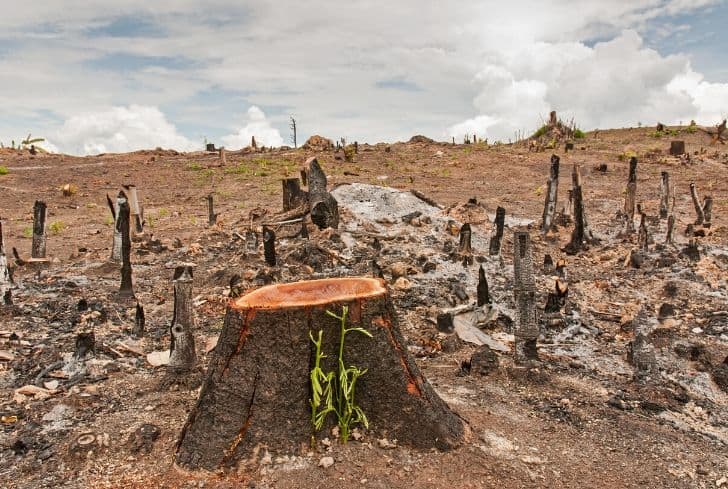
Scene of forest degradation by Saro Farms
For the seven years Mr. Godwin Obaseki functioned as executive governor of Edo State, in a two straight tenures of eight years, which terminated on November 12, 2024, his government tripled the Edo sensational record of being the highest driver of deforestation and habitat losses, vis-à-vis other environmental areas, amongst the 36 state of the country, which the United Nations Environment Programme (UNEP) and the Forestry Global Watch (FGW) had classified as one of the world’s highest of the scourges.
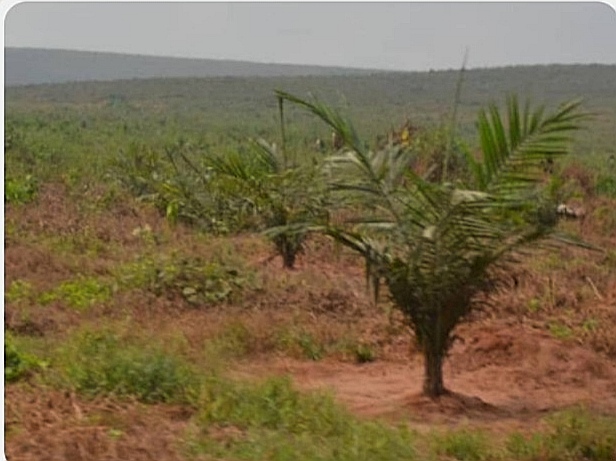
Vast Forest reserve land by Comrade Oshiomhole, dereserved by Obaseki for Okomu
Another study conducted by Nigeria Deforestation Rates and Statistics listed Edo, Ondo, Cross River, Taraba, and Ogun States as the worst affected states, with Edo leading the pack of environmental offenders.
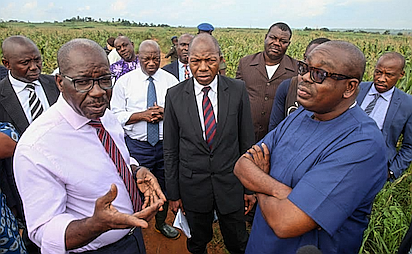
Obaseki and Managing Director of Saro Agro-Science Ltd, Oluwole Adyegbe during inspection of the 450 hectares maize farm joint venture in Sobe, Owan West LGA

The study by Global Forest Watch reported that in Nigeria, the top five regions were responsible for 54% of all tree cover loss between 2001 and 2022. “Edo had the most tree cover loss at 309 kha compared to an average of 33.7 kha.”
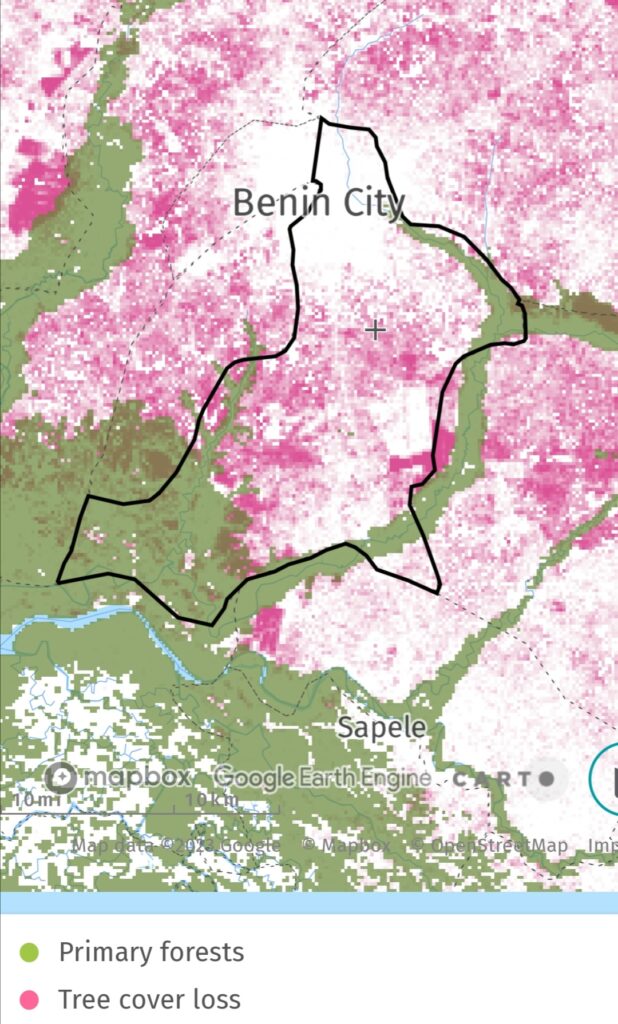
Satellite Image Showing Tree Cover Loss in Edo State, courtesy, Global Forestry Watch
Global Forest Watch added that, in 2010, Edo had 962 kha of natural forest, extending over 50% of its land area.
Sadly, “…in 2022, it lost 22.0 kha of natural forest, equivalent to 17.1 Mt of CO2 emissions.”
All the regions affected by tree cover loss are in Edo South and they account for 57%, with Uhunmwonde as number one most impacted with 71.8 kha compared to an average of 17.2 kha. Ovia North East followed at 55.5 kha; Orhionmwon with 49.7 kha; Ovia South West 35.8 kha and Ikpoba-Okha suffered 21.3 kha.
Conversely, before 2015, Edo had the top three tree cover regions in Nigeria, namely, Ovia South-West which had 232 kha, Ovia North East with 184 kha; Uhunmwonde 148 kha; Orhionmwon 115 kha and Ikpoba-Okha had 50.0 kha.
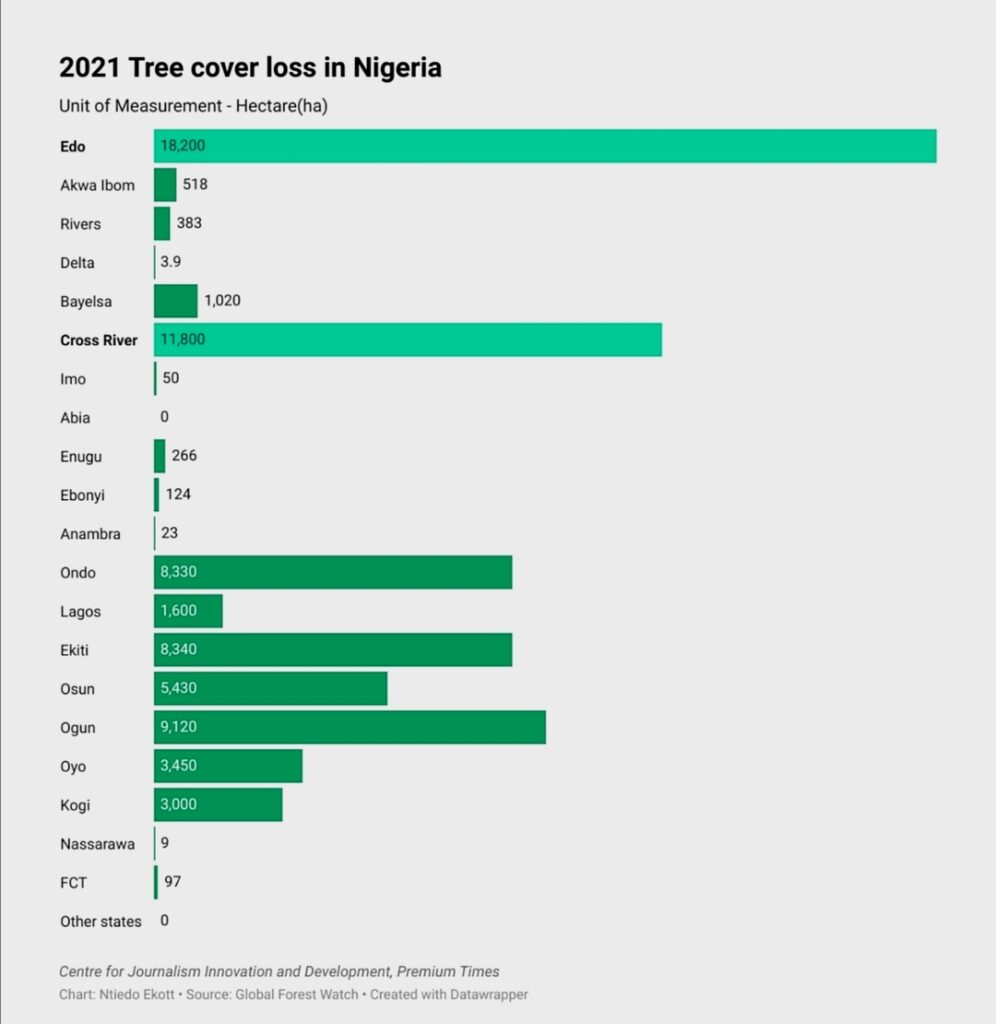
2021 Data showing showing Tree Cover Loss in States in Nigeria, courtesy
Brazenly, Obaseki handed over thousands of hectares to expatriate farmers without commensurate tangible benefits to the state and inhabitants of the land. His action has created the scenario of ‘white farmers’ versus the aborigines in Southern Africa countries.
In another word, Obaseki’s forest management, is the worst contributor and offender to Nigeria’s geometric increase of environmental violations, for which the country has a global notoriety.
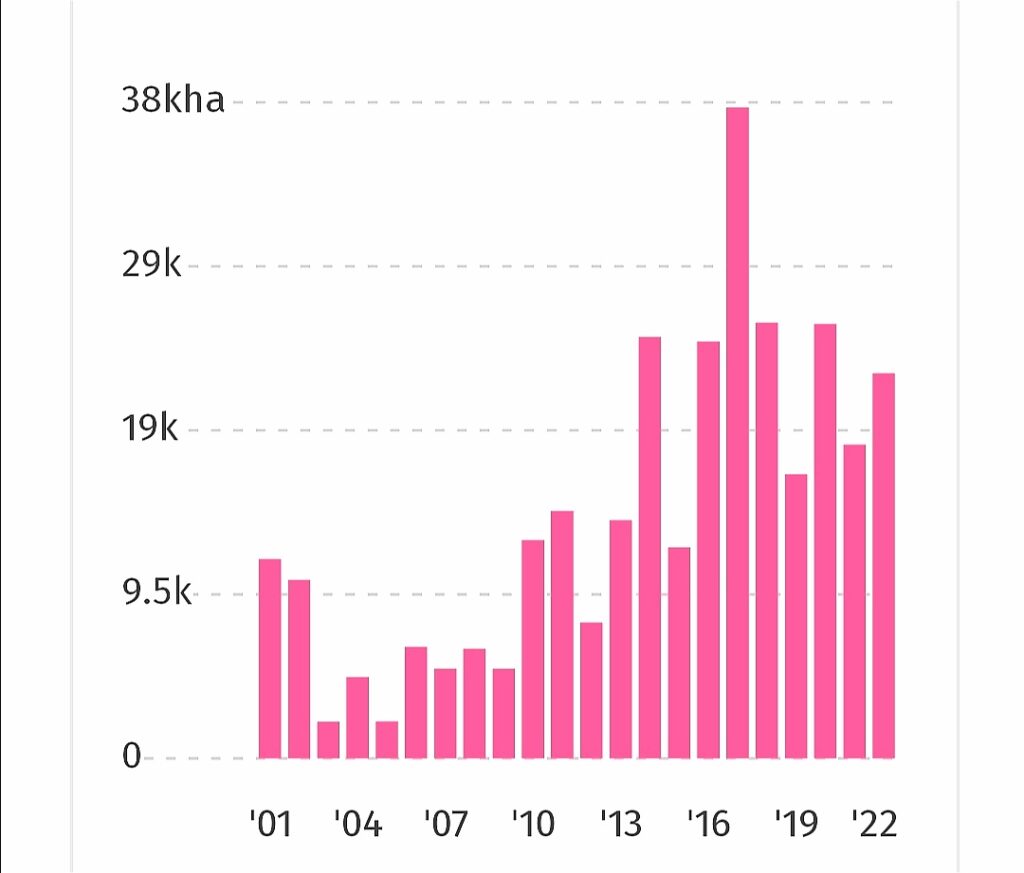
Graph showing Tree Cover equivalent of CO2e in Edo State for Eight years
In the aspect of Environmental Health and Sanitation, Edo is also at the backbench of the non-compliant states of the federation, for failing to put in place the necessary mechanisms for ensuring and sustaining environmental health and sanitation, with the prevalent outbreaks of acute perennial flooding and erosion, air and water borne pollutions, with its attendant diseases and epidemics.
For more articulation and understanding of Obaseki’s poor scorecard, in the varied areas of the environmental indicators, it would be better categorizing them on sub-headings as follows:
Forests and Biodiversity Losses:
Of all the agents that are implicated in Deforestation, losses to Biodiversity, Habitat and Livelihood, the indiscriminate allocation of vast forest reserved lands, belonging to local communities, for the erection of monocrop plantations, to big time plantations companies, most of which are foreign multinationals and their local front companies, is the highest driver.
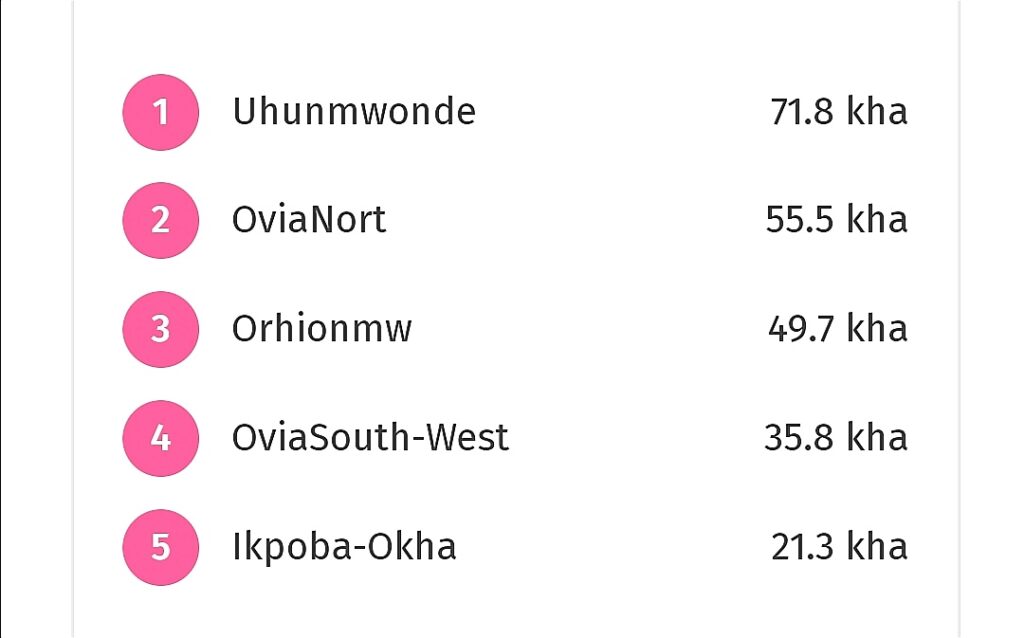
Tree Cover Loss in Five Local Government Area in Edo South
Yet, acute deforestation and habitat losses are the principal cause of the Climate Change scourge, which continually engages global attention, so much so that each country’s national and sub-governments are greatly committed to its control and remediation.
Indeed, the Obaseki’s administration dissipated the once vastly Guinea lowland rainforest reserves of the state, in huge hectares to his friends and special vehicle offshore companies who are owners of the multinational and local companies, for single oil palm and rubber plantations.
In a particular case, over 997 hectare of land was released to Amaya Real Estate Holdings Limited, a UK offshore domiciled company that was registered in April 2019. Amaya was designed and registered to be the major investor in failed Benin Enterprise Park in Agbonmoba Community, Km 22, Benin Sapele Road, Edo State.
The other hand, the Benin Enterprise Park Limited that was registered in January 2019, three months earlier and has Philip Iheanacho Iwuala, Modadeola Adio-Moses, as Directors and Shareholders.
Benin Enterprise Park Limited is listed at the Corporate Affairs Commission as ‘Private Company Limited by Shares’. The company has since been abandoned because of litigation between the company and Benin Owina River Basin Authority, the alleged owners of the choice land. Sadly, the beautiful rain forest has been destroyed with bulldozers. The local farmers have been displaced from their farms.
Midwest Herald had gathered that Obaseki allegedly ceded hectares of community forest reserve to the the SaroAfrica in Orhionmwon Local Government Area. This is in total defiant to the fact that, the company has a pending petition at the Economic and Financial Crimes Commission (EFCC) over the failed Sobe farm project.
In July 2020, farmers under the auspices of Edo State Concerned Farmers Association protested in Abuja over alleged misappropriation of the sum of N75 billion agricultural loan that was obtained by Edo State Government.
The group was reportedly led by one Comrade Afeiye Mohammed. They claimed the loan was procured from the Central Bank of Nigeria and World Bank.
In the said petition, the farmers alleged thus: “In 2017, we participated in the Agripreneur Programme in Sobe, Owan West Local Government Area of Edo State, where we planted and harvested Maize.
“However, since the harvest, three years ago, till date, we are yet to receive proceeds from the sale of our Maize by Edo State Government and Saro Agro Sciences Limited.”
Among other reliefs, “…the farmers asked the CBN and EFCC to take urgent steps to ensure that Edo State Government, Saro Agro Sciences Limited and NIRSAL pay Edo State Farmers proceeds from the sale of their crops.”
The administration of Comrade Adams Oshiomhole in 2015 revoked 13,750 hectares of the higher Biodiversity concentrated lowland of the Okomu Forest Reserve and the Owan Forest Reserve of the state.
But the last administration gave back the same land to the Okomu Oil Plc, who was alleged to have grabbed the vast lands from the Iyayi Group of Company, who inturn sold to the multinational firm for extension of its oil palm plantation.
The forest lands revocation by Comrade Oshiomhole which was handed back to the local communities of Okomu and Owan forest reserves are cited in the Edo State of Nigeria Gazette No 16 of 2015, Volume 1 (page 48 to 51)
As if these allocations were not enough, Obaseki also allegedly allocated more of the vast lands of Owan and Iueleha/Ora/Ozalla low-land rainforest reserves to Fayus Nigeria Limited (about 5,085 hectares) and several other local companies alleged to be fronts to the aforementioned multinational company.
In the adjoining forest reserve of Ekiadolor, in Ovia North East Local Government Area, tens of local communities are gnashing their teeth because their forest land had been bulldozed down for monocrops.
Whilst the communities carried out via street protests, many sought redress and got reliefs in the court of law, but sadly Obaseki flouted all court orders, while and threatened the communities and persons with security agents and brute force to grab their lands.
Such local communities negatively affected are well over 400, cutting across the local government areas of Ovia South West, Ovia North East, Owan West, Owan East, Esan West, Etsako East, Uhunmwode, Orhiomwon and Ikpoba Okha and others.
Wrong Forestry and Agriculture Business Models
In a bid to exercise the forceful grabbing of the vast forest reserve estates of Edo for single crop plantation owners, the last administration@ expunged the long existing forestry law, which gave the ownership of such farming lands to local communities, with the state government as holders of the lands as a trustee.
This was made easier by a rubber stamp Edo State House of Assembly that passed the colonial forestry law that has deprived members of their constituents their farmlands.
Under Mr. Godwin Emefiele, as CBN governor, Obaseki received an initial N67 billion loan that was earmarked for the development of oil palm plantations expansion for the aforementioned companies, and local farmers. But, the local farmers were schemed out by Edo State Government and the oil palm plantations.
So, while the oil plantation owners are smiling to the bank and repatriating their profits to Lebanon and other Middle East countries, Edo State indigenous farmers are left to scramble for leftover lands with herdsmen.
Extents of Biodiversity Loss
The vast forest lands, which contained diversed floras and other natural landforms, were mostly high up with trees and a canopy glory, lianas and other vegetative covers, which gave way to single crop plantations, an expression that the rich and important biodiversity of the rarest Guinea low-land rainforest were, most of which are endangered and many going extinct were brazenly bulldozed to replace single crop plantations.
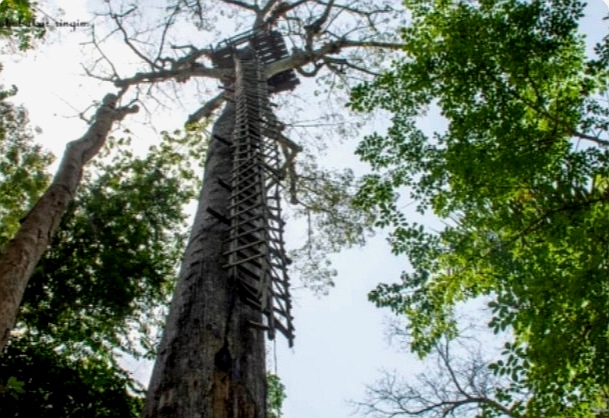
The World famous Tree House at Okomu National Park, Udo which Obaseki failed to protect from poachers
Obaseki’s understanding was that, a single oil palm tree or rubber makes a forest and are suitable replacements for the wildlife which had taken thousands of years to grow and are lavishly quoted in some global catalogues such as Convention of International Treaty on Endangered Species (CITES).
Heavy Poaching and Huge Destruction to Protected Areas.
Certain portions of the once rich low-land rainforest reserves of the state, including arboretums, which were protected by previous government, were unduly de-reserved and partly cut down by the government.
Poaching and other form of destruction like illegal logging, were visited on Important Protected Areas (IPAs) like the Okomu National Park, Udo and the Benin Ogba Zoo and Nature Park (BENZOPA), Benin City, under the watch of government.
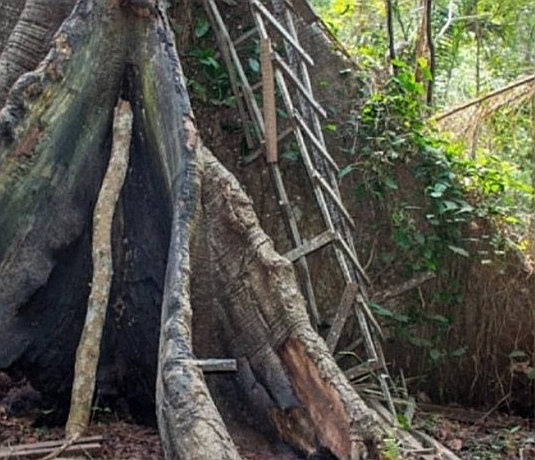
The buttressed base of one of the flagship trees of Okomu National Park lost during Obaseki’s administration
For months, Okomu Park was logged and its animal scandalously poached, which was heralded in the local and global media reportage.
Edo State Government folded his hand akimbo to let it go to waste. Yet, there was no point in the history of the park when it was so heavily vandalised. But for the African Nature Investors (ANI), which came to save the foremost global conservation enclave, with the current protection efforts, it would have been completely destroyed.
The destruction of Okomu Park, is contained in a damning report by Prof Emmanuel Aigbokhan, a Prof of Wildlife and Forestry of the University of Benin, under the Society for Conservation Biology.
BENZOPA, as one of the few last relics of Guinean low-land rainforest that is located and preserved in the urban centre of Africa, had been greatly threatened by Edo State Government’s fickled management, grabbing of the land and refusal to update and protect its Biodiversity and infrastructure.
Most of those landgrabbers and poachers, who violate the centre, are powerful people with government protection. They have been pressing for the relocation of the centre from its place so that they could also grab the land and loose its old heritage and grandeur glory.
While mouthing the establishment of forestry protection law, Obaseki stylishly ceded vast forest reserved to speculators acting as private estate developers. To fern his love for environment, Obaseki went to the same Okomu National Park which he had helped to destroy, to inaugurate the forestry commission, which was left to vandals.
Livelihood Destruction
The various forest reserved lands and other Free Areas, which hitherto were owned by aboriginal local communities, but forcibly grabbed by government, were life wires and sustained the various communities and their people through farming, logging, medicines, other forest products harvest, sources of water, traditional African worship centres, gaming and air replenishment.
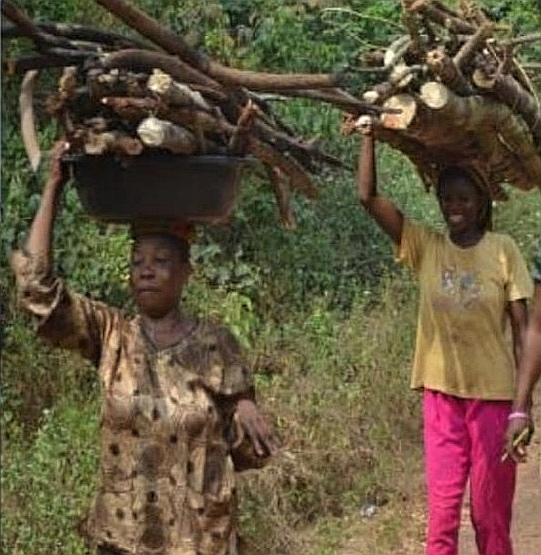
Local land owners sacked from their farms and energy source and livelihoods by foreign oil palm plantation owners
But through the grabbing of the land for about 99 years and more of the cycle of lease, government has rendered the local communities forever dispossessed and thrown out of their communities of birth and life sustenance.
And those who have been disposed, have been forced to migrate to the city centres thereby aggravating urban congestion and population drifts from the rural communities.
The promise by the plantation owners that they will benefit from their “huge investments” with tangible gains to the local people, such as employment in the plantations, has been jettisoned, and where jobs are available, the locals cry over abysmal wages.
There is also the discriminating land charges by Edo State Ministry of Agriculture, which expect the plantation owners to pay about N1,500 per hectare annually for the lease on the forestland, indigenous communities who own the the land, pay a minimum of N6000 per hectare under ‘Taungya’, a local community block farming, where lands are cultivated swiftly and are replaced with tree crops.
Edo locals farmers are not known to take up farm works as labourers offered by the oil palm plantations, rather, they prefer to till their own farmlands. As a result, such jobs are taken over by non Edo indigenes from north, South West and South-South part of Nigeria.
The unfavourable poorly thought out agricultural policy of Governor Godwin Obaseki will in the long run, displaced aboriginal land owners from Edo State.
See Also: United Against Corruption!






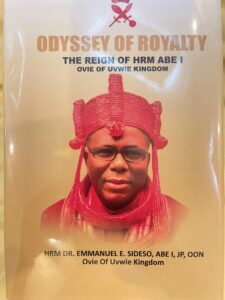



6 thoughts on “How Agriculture Policy Impacted on Edo South Environment and Livelihoods of Small Farmers”